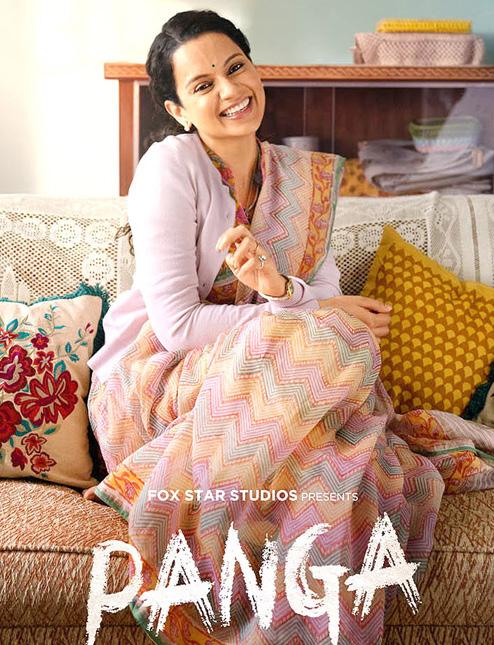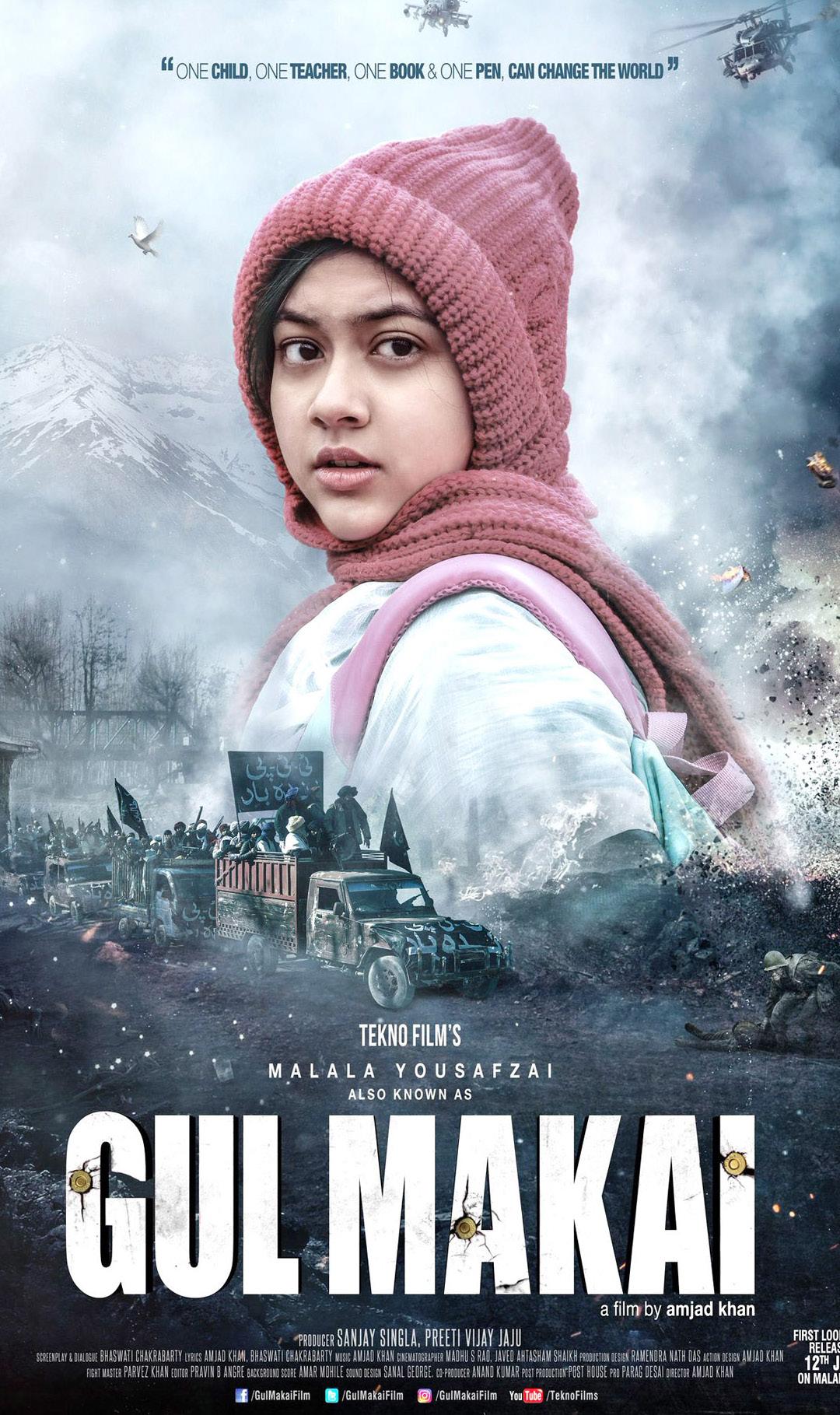
4 minute read
MALALA BIOPIC IS HALF-BAKED FARE
from 2020-02 Sydney (1)
by Indian Link
Gul Makai
STARRING: Reem Shaikh, Atul Kulkarni, Divya Dutta
DIRECTOR: HE Amjad Khan
Om Puri's two-scene cameo is a dead giveaway. Given Puri passed away in January 2017, this lm must be at least three years old. As the minutes pass, the incessant loud lmmaking that hits you has you wondering if this is some sort of a B-grader straight out of three decades ago.
That's sad, given the subject at hand. The story of Malala Yousafzai deserved a far more professional treatment in terms of character and narrative nuances. Instead, director HE Amjad Khan takes an incredible life story and turns it into a mere excuse to spin out standard commercial cliches.
To be fair, Bhashwati Chakraborty's script does reveal an intention of going beyond merely narrating the life of Malala. It tries gaining a perspective of the milieu in which she grew up, in Pakistan's Swat Valley of the late 2000s when the place was overrun by Taliban terror, and tries utilising that backdrop to lay bare the socio-politics of that era.
Yet, it soon becomes obvious that director Khan seems more interested in using that backdrop to merely create scope for unending violence and melodrama, and little else. A proper character sketch of Malala never really happens over the lm's runtime of around 130 minutes, and the life story of the lm's titular protagonist remains a shallow side show in her own biopic.
The title Gul Makai (‘ ower of corn’) refers to the pen name Malala used to write her ery columns against fundamentalists.
WHERE ARE THE PANGA MOMENTS?
Panga
STARRING: Kangana Ranaut, Jassi Gill, Richa Chadha, Neena Gupta, Yagna Bhasin
DIRECTOR: Ashwiny Iyer Tiwari
HHH
Panga is the sort of lm you easily fall in love with. It has a stellar cast in ne form, is directed by a lmmaker who knows her business of storytelling only too well, and it manages to deliver a topical comment without getting too preachy about it. It is an entertaining lm that e ortlessly reaches out to the wider audience, and at the same time doesn't lose connect with basic cinematic aesthetics.
In short, Panga ticks all the boxes a good Bollywood mainstream lm should. Co-writer and director Ashwiny Iyer Tiwari's third lm, it underlines what we had realised after Nil Battey Sannata and Bareilly Ki Bar - she is one of the most exciting lmmaking brains in newage Bollywood.
Tiwari once again takes to a smalltown milieu to draw her plot and characters. We are introduced to Jaya
Nigam (Kangana Ranaut) of Bhopal, who blissfully balances a doting husband and son with her job as a railway ticket clerk.
Nitesh Tiwari's screenplay establishes Jaya's extraordinary past at the very outset. She was a star kabaddi player who even captained India once, before she gave it all up for marriage and motherhood.
Yet her passion for kabaddi still lurks subconsciously – deep in sleep once, she literally throws her husband (Jassi Gill) o the bed with a barrage of kicks.
When her little boy discovers she gave up her dream to raise him, he suggests innocently that she must return to the sport.
Ashwiny Iyer Tiwari has successfully served up an inspirational package. Jaya's gradual comeback takes shape despite hurdles in the way. Credibly, the narrative imparts its message of women’s empowerment without inyour-face vibes.
What comes across as a downer of sorts is the lm's lack of genuine panga moments, despite the realism that sustains its plot and characters. Panga could have done with a few strong con ict points. Essentially, what you get is a feelgood portrait of struggle. Everything and everybody in this lm seems so nice at all times. Jaya is nice, so are her husband, kid and mom. Her best friend is nice and so are the coaches, selectors, even rival
Reem Shaikh is cast as Malala, and she never really manages to emerge beyond the half-baked role she is given to play out, in a screenplay that reveals no attempt to look at the pervading Taliban situation from the eyes of its protagonist.

Indeed, the storytelling su ers owing to the narrative's inability to decide what it must focus on - the Pak army, as it struggles to reign in the Taliban, or Malala herself, or her father Ziauddin Yousafzai (Atul Kulkarni), a liberalminded school principal who advocates education for women as well as their right to live a life without shackles.
The years around 2007-2008, when most of the events of this lm take place, was a time when Swat was plundered by strife, and Khan was perhaps trying to set a grim tone with the odd gruesome peek into battle mayhem. He could have ensured that the lm went slower with the hamming quotient. The sheer loudness in execution robs the lm of all impact.
Even seasoned actors as Atul Kulkarni and Divya Dutta (cast as Malala's mother Pekai Yousafzai) cannot fully rise above the sheer mediocrity of their characters. Other familiar faces such as Arif Zakaria, Mukesh Rishi and Abhimanyu Singh, cast as Talibani fundamentalists, settle for one-dimensional villain roles - they play out lmi terrorists reminiscent of nineties stereotypes in this half-baked fare.
In 2015, American lmmaker Davis Guggenheim made a documentary titled He Named Me Malala. While that lm is no scintillating exercise on the subject either, it still gives you a concise idea of who Malala Yousafzai is. For an even more authentic idea, you could always pick up a copy of her autobiography.
Vinayak Chakravorty
players within the team.
The lack of ample grey shades also deprives the script of desired depth, and gives it an easy predictability. Such warts, however, are covered up easily by the lm's brilliant cast.
Kangana Ranaut shines above all in an author-backed role, balancing with aplomb the various streaks that de ne Jaya - from being an overprotective mother and caring wife to the quietly resilient sportsperson out chasing an impossible comeback. Jaya is a nuanced mix of emotions, and Kangana relishes playing out every detail.
While Jassi Gill essays Jaya's husband with an understated quality, child actor Yagna Bhasin is simply outstanding as her son. Richa Chadha, as Jaya's best friend and comeback mentor, and Neena Gupta as her mother add value to the narrative despite minimal footage.
Panga is e ectively lmed, with Jay I. Patel's camera complimenting the overall mellow tone of the lm, although the editing (Ballu Saluja) could have been tighter in places. The lm reiterates the idea that it is never too late to start chasing your dream - which gives it instant likability.
Vinayak Chakravorty










